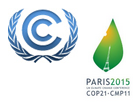National and local governments, river basin organizations, civil society and businesses announced the creation of coalitions and initiatives related to water and climate change at an event on ‘Water Resilience' under the Lima to Paris Action Agenda (LPAA), which is convening at the Paris Climate Change Conference.
These initiatives include: the Paris Pact on Water and Adaptation, MegaCities Coalition on Water; Business Alliance for Water and Climate Change; Adaptation of the West African coastal areas; and Maritime Regions in Action against Climate Change.
 2 December 2015: National and local governments, river basin organizations, civil society and businesses announced the creation of coalitions and initiatives related to water and climate change at an event on ‘Water Resilience’ under the Lima to Paris Action Agenda (LPAA), which is convening at the Paris Climate Change Conference. These initiatives include: the Paris Pact on Water and Adaptation, MegaCities Coalition on Water; Business Alliance for Water and Climate Change; Adaptation of the West African coastal areas; and Maritime Regions in Action against Climate Change.
2 December 2015: National and local governments, river basin organizations, civil society and businesses announced the creation of coalitions and initiatives related to water and climate change at an event on ‘Water Resilience’ under the Lima to Paris Action Agenda (LPAA), which is convening at the Paris Climate Change Conference. These initiatives include: the Paris Pact on Water and Adaptation, MegaCities Coalition on Water; Business Alliance for Water and Climate Change; Adaptation of the West African coastal areas; and Maritime Regions in Action against Climate Change.
The Paris Pact on Water and Climate Change Adaptation, which includes nearly 290 water basin organizations, aims to make water systems more resilient to climate change impacts through individual commitments to implement adaptation plans, strengthen water monitoring systems in river basins and promote financial sustainability and investments in water systems management. The Pact emphasizes that actions to improve water resources management are critical in achieving the Sustainable Development Goals (SDGs), according to the UN.
Commitments under the Pact include: a three-year commitment to the Ecocuencas program, a financial mechanism for adaptation in river basins in Brazil, Colombia, Ecuador and Peru; and a ten-year investment plan to strengthen resilience to climate change in nine countries in the Niger Basin, with financial support from the World Bank, the Global Environment Facility (GEF) and others. The Delta Coalition aims to raise awareness on deltas in global policy discussions and increase resilience for delta populations in the 12 participating countries from around the world.
China committed to improve management of its Hai river basin, with support from France. India committed to build climate resilience through improved groundwater management. Mexico will improve management of its water resources and water services in the Mexico valley through a four-year collaboration. Morocco announced a project to increase resilience in its agriculture sector by improving irrigation.
Pact commitments to monitoring include: a seven-year commitment under the Mediterranean Water Platform to assess the state and trends of water resources, with the support of the European Commission (EC); and the launch of a hydrological and meteorological monitoring program in the Basin of the Congo.
The Mega Cities Coalition includes 10 megacities with 85 million people. It established a knowledge exchange platform and launched several projects, including a commitment by the World Bank to enhance ‘Water Security and Climate Resilience’ in Kenya’s coastal region and a program to protect a Dakar, Senegal, suburb from flooding.
The private sector mobilized a coalition of more than 27 companies under the Business Alliance for Water and Climate Change, which aims to reduce risks related to the availability and quality of water. The Alliance will work to promote collective action within river basins and take stewardship of water use through the business value chain, among other actions.
Stakeholders also made commitments to address the impacts of climate change on marine environments, including initiatives related to marine protected areas (MPAs), shoreline management and commercial shipping. Commitments focus on coastal risk management and adaptation actions, such as partnerships to reduce coastal erosion and flood risk in West Africa, protection and restoration of mangroves, and actions by the maritime transport sector to reduce greenhouse gas (GHG) emissions by 20% in 2020 and by 50% in 2050.
The LPAA is a joint undertaking of the Peruvian and French Presidencies of the Conference of the Parties (COP) to the UNFCCC, the Office of the UN Secretary-General and the UNFCCC Secretariat. The LPAA aims to strengthen climate action through mobilizing robust global action towards low-carbon and resilient societies; providing enhanced support to existing initiatives; and mobilizing new partners and providing a platform for the visibility of their actions, commitments and results. [UNFCCC Press Release] [UN Press Release] [World Bank Press Release] [LPAA Website] [IISD RS Coverage of COP 21]